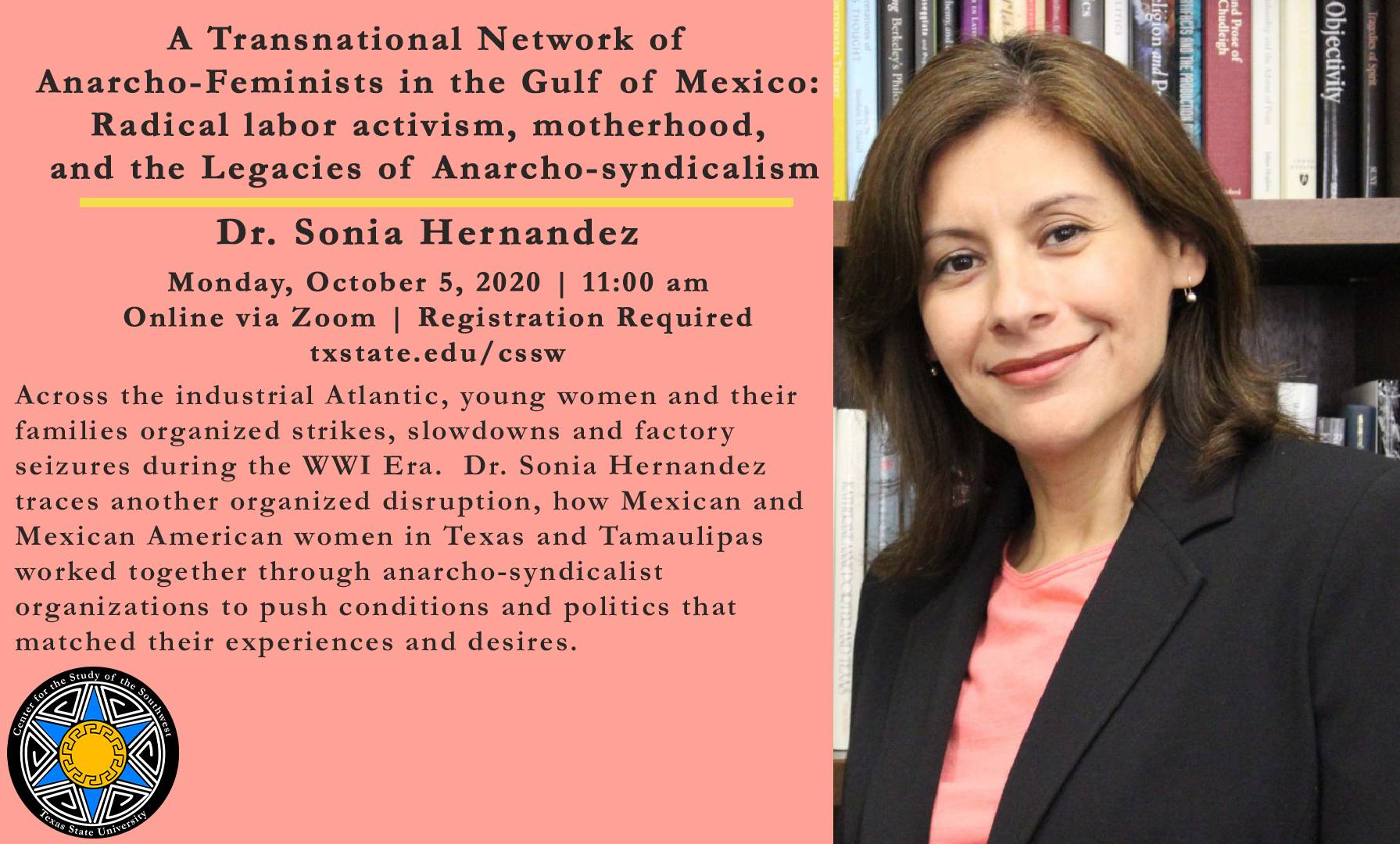Across the industrial Atlantic, young women and their families organized strikes, slowdowns and factory seizures during the WWI Era. Dr. Sonia Hernandez traces another organized disruption, how Mexican and Mexican American women in Texas and Tamaulipas worked together through anarcho-syndicalist organizations to push conditions and politics that matched their experiences and desires. Working with archives and the Spanish language press, Dr. Sonia Hernandez, TAMU, tracks a transnationally connected labor movement organized by women and shares insight into the broader industrial, socio-political conditions that made this anarchist movement possible. While anarchism and anarcho-syndicalism declined by the mid-1930s, at least in this region, a transnational anarcho-feminist legacy remained forming part of the history and memory of the Texas-Mexico borderlands.
 Sonia Hernandez, a native of the Rio Grande Valley, received a Ph.D from the University of Houston in 2006 and began teaching at Texas A&M University in the Fall of 2014. Dr. Hernandez specializes in the intersections of gender and labor in the U.S.-Mexican Borderlands, Chicana/o history, and Modern Mexico. She has published in Spanish and English; her book, Working Women into the Borderlands (Texas A&M University Press, 2014) received the Sara A. Whaley Book Prize from the National Women’s Studies Association and the Liz Carpenter Award from the Texas State Historical Association. Dr. Hernandez’s forthcoming book, Women’s Anarchism in the Mexican Borderlands: Radical Labor Activism, 1900-1938 (University of Illinois Press), examines a transnational network of labor activists, in great part sustained by women during the first years of the twentieth century. She is working on a new book project that revisits the Gregorio Cortez near-lynching attempt in 1901 examining the intersections of state-sanctioned violence, gender, and the emergence of unlikely transnational alliances. She is also co-founder of the public history project, Refusing to Forget.
Sonia Hernandez, a native of the Rio Grande Valley, received a Ph.D from the University of Houston in 2006 and began teaching at Texas A&M University in the Fall of 2014. Dr. Hernandez specializes in the intersections of gender and labor in the U.S.-Mexican Borderlands, Chicana/o history, and Modern Mexico. She has published in Spanish and English; her book, Working Women into the Borderlands (Texas A&M University Press, 2014) received the Sara A. Whaley Book Prize from the National Women’s Studies Association and the Liz Carpenter Award from the Texas State Historical Association. Dr. Hernandez’s forthcoming book, Women’s Anarchism in the Mexican Borderlands: Radical Labor Activism, 1900-1938 (University of Illinois Press), examines a transnational network of labor activists, in great part sustained by women during the first years of the twentieth century. She is working on a new book project that revisits the Gregorio Cortez near-lynching attempt in 1901 examining the intersections of state-sanctioned violence, gender, and the emergence of unlikely transnational alliances. She is also co-founder of the public history project, Refusing to Forget.


 Sonia Hernandez, a native of the Rio Grande Valley, received a Ph.D from the University of Houston in 2006 and began teaching at Texas A&M University in the Fall of 2014. Dr. Hernandez specializes in the intersections of gender and labor in the U.S.-Mexican Borderlands, Chicana/o history, and Modern Mexico. She has published in Spanish and English; her book, Working Women into the Borderlands (Texas A&M University Press, 2014) received the Sara A. Whaley Book Prize from the National Women’s Studies Association and the Liz Carpenter Award from the Texas State Historical Association. Dr. Hernandez’s forthcoming book, Women’s Anarchism in the Mexican Borderlands: Radical Labor Activism, 1900-1938 (University of Illinois Press), examines a transnational network of labor activists, in great part sustained by women during the first years of the twentieth century. She is working on a new book project that revisits the Gregorio Cortez near-lynching attempt in 1901 examining the intersections of state-sanctioned violence, gender, and the emergence of unlikely transnational alliances. She is also co-founder of the public history project, Refusing to Forget.
Sonia Hernandez, a native of the Rio Grande Valley, received a Ph.D from the University of Houston in 2006 and began teaching at Texas A&M University in the Fall of 2014. Dr. Hernandez specializes in the intersections of gender and labor in the U.S.-Mexican Borderlands, Chicana/o history, and Modern Mexico. She has published in Spanish and English; her book, Working Women into the Borderlands (Texas A&M University Press, 2014) received the Sara A. Whaley Book Prize from the National Women’s Studies Association and the Liz Carpenter Award from the Texas State Historical Association. Dr. Hernandez’s forthcoming book, Women’s Anarchism in the Mexican Borderlands: Radical Labor Activism, 1900-1938 (University of Illinois Press), examines a transnational network of labor activists, in great part sustained by women during the first years of the twentieth century. She is working on a new book project that revisits the Gregorio Cortez near-lynching attempt in 1901 examining the intersections of state-sanctioned violence, gender, and the emergence of unlikely transnational alliances. She is also co-founder of the public history project, Refusing to Forget.